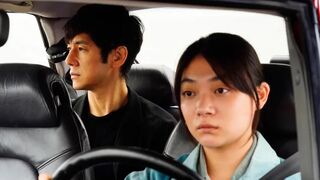Play
"Drive My Car" Explores the Heartache of Loss and Demands of Recovery
Winner of the 2022 best foreign film Oscar shows how tragedy can be metabolized.
Posted November 2, 2022 Reviewed by Lybi Ma
Key points
- Tragic loss never leaves the soul. What is the path to a new life after trauma?
- Sign language is not what is unsaid. It is what is said, with more clarity and pathos.

Gut-wrenching tragedy, a tragedy that summons howls of pain, can break a heart and shatter a soul. Tragedy of the magnitude evoked by an early death of a loved one, a child, or a spouse does not make us stronger. Nor does it fade away, and become no longer visible. It remains salient in the dusty ruin of a life.
Can frail humans live through a psychically catastrophic event, and surface to live life again? On the exterior, the scars of devastation may no longer be perceptible, except inferentially from how a life becomes wrapped in a protective cocoon. Wounds left by catastrophe are bundled in layers of insulation, so they can seem bloodless—perhaps because there is no more blood to be let. Which is not at all the same thing as a wound that has healed. The course of a person’s path has changed, and so have they.
Drive My Car (Netflix 2022) begins with the disastrous backstory of the film’s central character, Yusuke Kafuku (Hidetochi Nishijima). It is a while into the film before the credits begin to roll. They announce the present. They alert the viewer to a life sealed for protection.
The story unfolds by emotional step by step as the seal is removed, at the languid pace of Kafuku’s post-cataleptic existence. He is not alone aching in pain. The film slowly presents, center-stage, another character, his driver, Misaki Watari (Tôko Miura)—hired because of Kafuku’s eyesight problems. She, like him, goes about an affectless, almost robotic, life—with direction but no purpose.
Drive My Car is a short story by Haruki Murakami, a popular novelist and nonfiction writer in Japan and abroad. This tale, as rendered by director Ryusuke Hamaguchi and written by Haruki Murakami and Takamasa Oe, is mesmerizing, bringing the viewer ever closer to the heartache of loss and the unglamorous demands of recovery. This film has won countless awards, including an Oscar for best international feature film (2022), the Japan Academy Prize for best picture, the Cannes Film Festival Prize, and a Golden Globe, to name but a few. "Drive My Car" is a contemporary, near to three-hour dramatic film, which made every moment count.
The film revolves around Kafuku, who has won a directing repertoire engagement, in Hiroshima, to stage Chekov’s "Uncle Vanya" (released in 1898). No small task, amplified because this version of its script is written to be acted in Japanese. Korean, English, and Korean Sign Language. Lee Yoon-a (Park Yu-rim) will astonish you, as she makes Korean Sign come alive and brings still beauty to her role in both the play and the film.
Kafuku has hired a volatile young actor, Misaki Watari (Toko Miura), to play Vanya, not a match for this youth chosen to play the gray hair in the title role. His selection by Kafuku is all the more notable given that the tall and beautiful Miura previously had an affair with Kafuku's late wife, a screenwriter named Oto.
Both Kafuku’s car (a vintage red Turbo Saab) and the multilingual casting have their unspoken and metaphorical roles as well. While there is a lot going on in this film, you won’t need a casting list to follow it.
As the film comes to its finish, we witness human beauty in the form of Kafuku and Watari (his driver) each revealing their agonizing loss and each holding themselves responsible for the boundless tragedy of mortal sin. They each, thus, are freed to know life again.
Two terms in human physiology, metabolize and catabolize, describe how our bodies process what comes to dwell in them. Catabolism is a degradative process, the breakdown of complex, organic materials to protect the body or provide it energy. Metabolism, on the other hand, uses organic materials in the body to enable growth and reproduction.
We can thank author Haruki Murakami and director Ryusuke Hamaguchi for elegantly showing how awful, human tragedy need not be catabolized, but rather how it can be metabolized and transformed into renewed life and growth. "Drive My Car" may take three hours to get to that metabolized state of grace. But that’s not so long when you consider that instrumental to arriving at a renewed life means facing what seemed unbearable and deadening—and being able to do so with human kindness and tenderness, so we, too, may find the light.


